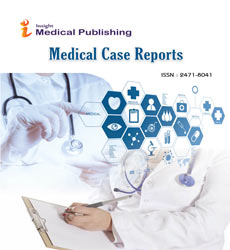Diagnostic Approaches for Neurodevelopmental Disorders
Richard Mornas
Department of Rehabilitation and Regenerative Medicine, Columbia University Irving Medical Center, New York, USA
Published Date: 2024-07-18DOI10.36648/2471-8041.10.04.388
Richard Mornas*
Department of Regenerative Medicine, Columbia University Irving Medical Center, New York, USA
- *Corresponding Author:
- Richard Mornas
Department of Rehabilitation and Regenerative Medicine, Columbia University Irving Medical Center, New York,
USA,
E-mail: mornas_R@cuomc.edu
Received date: June 17, 2024, Manuscript No. IPMCRS-24-19527; Editor assigned date: June 20, 2024, PreQC No. IPMCRS-24-19527 (PQ); Reviewed date: July 04, 2024, QC No. IPMCRS-24-19527; Revised date: July 11, 2024, Manuscript No. IPMCRS-24-19527 (R); Published date: July 18, 2024, DOI: 10.36648/2471-8041.10.04.388
Citation: Mornas R (2024) Diagnostic Approaches for Neurodevelopmental Disorders. Med Case Rep Vol.10 No.04: 388.
Description
Neurodevelopmental disorders are a diverse group of conditions characterized by abnormal brain development, which impacts an individual's cognitive, emotional and behavioral functioning. These disorders often manifest early in life and can significantly affect various aspects of development, including motor skills, communication and social interactions. Understanding neuro developmental disorders involves examining their etiology, symptoms, diagnosis and treatment options.
Autism spectrum disorder is a complex developmental disorder characterized by challenges in social interaction, communication and repetitive behaviors. Individuals with ASD may also have sensory processing issues and exhibit a wide range of intellectual abilities. Symptoms typically appear before the age of three and can vary from mild to severe. Early intervention, including behavioral therapies and educational support, can improve outcomes and help individuals develop essential life skills.
ADHD is marked by persistent patterns of inattention, hyperactivity and impulsivity that interfere with daily functioning. Children with ADHD may struggle with tasks requiring sustained focus, organization and impulse control. Treatment often includes a combination of behavioral therapies and medications, such as stimulants and non-stimulants, which help manage symptoms and improve executive functioning.
Specific learning disabilities, such as dyslexia, dysgraphia and dyscalculia, affect a person's ability to acquire and use academic skills. Dyslexia impacts reading and language processing, dysgraphia affects writing and fine motor skills and dyscalculia involves difficulties with mathematical concepts. Interventions typically include tailored educational strategies, accommodations, and specialized tutoring to address the individual's learning needs.
Intellectual disabilities involve below-average intellectual functioning and adaptive behavior deficits that emerge during the developmental period. These conditions, including down syndrome and fragile X syndrome, affect cognitive abilities and daily functioning. Early diagnosis and individualized support services, including educational and vocational training, can enhance quality of life and support skill development.
Communication disorders surround conditions such as speech sound disorders, language disorders and social communication disorders. These disorders impact an individual's ability to produce or understand spoken language and engage effectively in social interactions. Speech-language therapy is often the primary intervention, focusing on improving communication skills and social functioning.
Etiology and risk factors
The causes of neurodevelopmental disorders are multi factorial and involve genetic, environmental and neurobiological factors. Genetic pre dispositions play a significant role, as many neuro developmental disorders have hereditary components. For instance, ASD and ADHD have been linked to genetic mutations and variations. Environmental factors, such as prenatal exposure to toxins, maternal infections and complications during pregnancy and birth, also contribute to the risk of developing neuro developmental disorders.
Neuro biological research has identified differences in brain structure and function associated with these disorders. For example, alterations in brain connectivity and neurotransmitter systems have been observed in individuals with ASD and ADHD. These findings highlight the complex exchange between genetic and environmental factors in shaping brain development and functioning.
Diagnosing neuro developmental disorders typically involves a comprehensive evaluation by healthcare professionals, including pediatricians, psychologists and neurologists. The assessment process includes detailed developmental history, clinical observations and standardized tests to evaluate cognitive, behavioral and emotional functioning. Early diagnosis is important for accessing appropriate interventions and support services.
Behavioral therapy Applied Behavioral Analysis (ABA) and other behavioral therapies are commonly used for ASD to address specific behaviors and promote skill development. Educational interventions specialized educational programs and accommodations can support individuals with learning disabilities and intellectual disabilities.
Medication For conditions like ADHD, medications such as stimulants and non-stimulants can help manage symptoms and improve functioning. Speech and language supports individuals with communication disorders, focusing on enhancing language and social communication skills.
Neuro developmental disorders present a range of challenges that impact an individual's development and daily functioning. Early identification, comprehensive assessment and tailored interventions are essential for supporting individuals with these disorders. By understanding the diverse nature of neuro developmental disorders and employing effective treatment strategies, it is possible to improve outcomes and enhance the quality of life for those affected. As research advances, new insights into the causes and management of neuro developmental disorders will continue to shape and refine approaches to care and support.

Open Access Journals
- Aquaculture & Veterinary Science
- Chemistry & Chemical Sciences
- Clinical Sciences
- Engineering
- General Science
- Genetics & Molecular Biology
- Health Care & Nursing
- Immunology & Microbiology
- Materials Science
- Mathematics & Physics
- Medical Sciences
- Neurology & Psychiatry
- Oncology & Cancer Science
- Pharmaceutical Sciences
